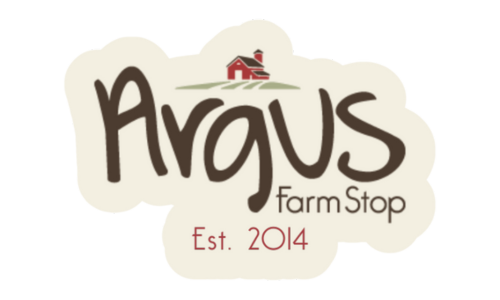"Our future is local" is more than just a tag line for us.
We live it.
When you shop here, you are shopping directly from local farms and producers.
Why Buy Your Food From Local Producers?
Why wouldn't you prefer something grown nearby to something shipped from a thousand miles away - or another country?
When local farms have a dependable place to sell their produce, they will grow wonderful produce! We sell produce, meats, dairy, and artisanal goods for over 200 producers!
Fresher and better quality
Food grown locally is fresher than food shipped from a distance. The farmers who sell at Argus Farm Stop grow on small farms generally from 5-50 miles from our market. Some are certified organic, some use "beyond organic" practices, and NONE are "conventional" farmers*. Our farms grow sustainably, using methods like crop rotation, and IPM (integrated pest management). They raise their meats and poultry using practices that are humane and healthy. The eggs here are from hens who really do roam free.
Our produce is often picked the morning that it is delivered. Customers tell us frequently that they notice the difference. And our farmers actively help us make sure we display and store their produce to their high standards. Their name is on the produce and they care about how it is maintained.
Our staff can tell you specifically about the farms your purchases come from, and answer questions you may have.
*Conventional farming refers to a method of farming in which the use of GMO's, chemical pesticides/herbicides and chemical fertilizers is allowed.
Better for the environment
Buying local food means that we use fewer fossil fuels in transportation. Sustainable farming methods use fewer chemicals and promote biological diversity. Our farms are small, and our farmers enjoy having a market where they can grow all year, a short distance from their farms.
Better for the community & the local economy
When you shop at Argus Farm Stop, you are buying DIRECTLY from the farms and producers. Our farmers own and price their goods. They receive 70% of that selling price. This is a significantly better margin than they can achieve in any other retail setting. The latest USDA study shows that small farms receive only 14.9 cents of every dollar of selling price from a traditional store.
When you shop at Argus Farm Stop, you are joining a COMMUNITY formed around local food. When you come in, you are likely to meet a farmer delivering goods, or another customer asking questions about the products in the market, or a staffer who can explain the growing practices of our farms.
“Researchers examined six different scenarios in which existing farmers double or triple the amount of fruits and vegetables they sell into fresh produce markets... [The] study determined the shift could increase net farm income in Michigan by $164 million, or nearly 16 percent. As farm families spend this new income, the study showed they could generate up to 1,889 new jobs across the state and $187 million in new personal income from those jobs. ”
— Growing Michigan’s Future – A Guide to Marketing Your Michigan Food and Agriculture Products” Second edition, November 2012 (p. 8)
Argus Farm Stop is inspired by Local Roots (Wooster, OH) and The Wild Ramp (Huntington, WV).
Following is a listing of reference articles and books that we have found informative and energizing in our quest to have a positive impact on food availability in our local community:
The Freshest Ideas are In Small Grocery Stores.
-The New York Times
To Revive Rural America, We Must Fix Our Broken Food System.
-The American Conservative
Will Allen, The Good Food Revolution: Growing Healthy Food, People, and Communities, Gotham Books, 2012.
Dan Barber, The Third Plate Field Notes on the Future of Food Penguin Books 2015
Sharon Astyk & Aaron Newton. A Nation of Farmers Defeating the Food Crisis on American Soil New Society Publishers2009
Barry Estabrook, Tomatoland: How Modern Industrial Agriculture Destroyed Our Most Alluring Fruit, Andrews McMeel Publishing, LLC, 2011.
Ben Hewitt, The Town That Food Saved: How One Community Found Vitality in Local Food, Rodale, 2010.
Tracie McMillan, The American Way of Eating: Undercover at Walmart, Applebee’s, Farm Fields and the Dinner Table, Scribner, 2012.
Michael Pollan, The Omnivore’s Dilemma: A Natural History of Four Meals, Penguin Books, 2007. (And most anything by Michael Pollan is inspiring)
Michigan Department of Agriculture and Rural Development (MDARD), Growing Michigan’s Future – A Guide to Marketing Your Michigan Food and Agriculture Products, Second edition, November 2012. (link)
The New Farmer's Almanac - 2015 by the Greenhorns, editor-in-chief: Severine von Tscharner Flemming
Lucie B. Amundsen. Locally Laid 2016 is a humorous telling of this unlikely egg farm start up and through it, a painless lesson in America’s food system.\
Linda Diane Feldt, A Cookbook: Spinach and Beyond; Loving Life and Dark Green Leafy Vegetables 2003
Links to interesting things:
10 Reasons to Buy Local from the Kerr Center for Sustainable Agriculture
http://www.kerrcenter.com/pdf/10_reasons_to_buy_local.pdf
Farms are growing in Washtenaw County even as they decline nationwide. Here's why. https://www.secondwavemedia.com/concentrate/features/farmgrowth0721.aspx


